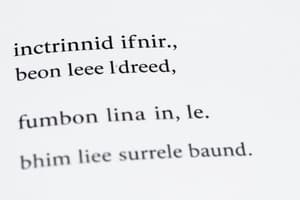Podcast
Questions and Answers
What is the main function of a pronoun?
What is the main function of a pronoun?
- To replace an adjective
- To replace a noun (correct)
- To replace an adverb
- To replace a verb
Which of the following is a type of pronoun?
Which of the following is a type of pronoun?
- Adjective
- Adverb
- Preposition
- Reflexive pronoun (correct)
What is the position of a reflexive pronoun in a sentence?
What is the position of a reflexive pronoun in a sentence?
- In front of the verb in questions
- At the end of the sentence
- Before the verb (correct)
- After the verb
When are indirect object pronouns used?
When are indirect object pronouns used?
What is the function of a direct object pronoun?
What is the function of a direct object pronoun?
When are possessive pronouns used?
When are possessive pronouns used?
Where do indirect object pronouns usually go in a sentence?
Where do indirect object pronouns usually go in a sentence?
Why are reflexive pronouns used?
Why are reflexive pronouns used?
What is the correct translation of 'who' in the sentence 'I have a brother who is 12 years old.'?
What is the correct translation of 'who' in the sentence 'I have a brother who is 12 years old.'?
Which relative pronoun is used to refer to people and has a plural form 'quienes'?
Which relative pronoun is used to refer to people and has a plural form 'quienes'?
What is the correct translation of 'whose' in the sentence 'The woman, whose son is speaking, is principal of the school.'?
What is the correct translation of 'whose' in the sentence 'The woman, whose son is speaking, is principal of the school.'?
Which of the following sentences is correct?
Which of the following sentences is correct?
What is the correct translation of 'that which' in the sentence 'I reserved a room with sea views but that which I have only looks out on the courtyard.'?
What is the correct translation of 'that which' in the sentence 'I reserved a room with sea views but that which I have only looks out on the courtyard.'?
Which of the following sentences is correct?
Which of the following sentences is correct?
What is the correct translation of 'with whom' in the sentence 'The girl with whom I went to the cinema is my girlfriend.'?
What is the correct translation of 'with whom' in the sentence 'The girl with whom I went to the cinema is my girlfriend.'?
Which relative pronoun is used to refer to things and can be roughly translated as 'that which' or 'the one that'?
Which relative pronoun is used to refer to things and can be roughly translated as 'that which' or 'the one that'?
Flashcards are hidden until you start studying
Study Notes
Los pronombres - Pronouns
- A pronoun replaces a noun in a sentence
- There are different types of pronouns in Spanish:
- Subject pronouns (e.g., I, you, he, she, we, they)
- Reflexive pronouns (e.g., myself, yourself, himself, herself, ourselves, yourselves, themselves)
- Direct object pronouns (e.g., me, you, him, her, us, you, them)
- Indirect object pronouns (e.g., to me, to you, to him, to her, to us, to you, to them)
Spanish Personal and Possessive Pronouns Summary
- Personal pronouns:
- Subject: yo, tú, él, ella, nosotros, vosotros, ellos
- Reflexive: me, te, se, nos, os, se
- Direct object: me, te, lo/la, nos, os, los/las
- Indirect object: me, te, le, nos, os, les
- Possessive pronouns:
- Possessive adjectives: mío/a(s), tuyo/-a(s), suyo/-a(s), nuestro/-a(s), vuestro/-a(s), suyo/-a(s)
Usage and Position
- Subject pronouns are used as the subject of a verb
- Reflexive pronouns are used with reflexive verbs or for emphasis
- Direct object pronouns are used with verbs that take an object
- Indirect object pronouns are used with verbs that take two objects
- Possessive pronouns are used to show possession
- Pronouns usually come before the verb in a statement, but may come at the end in questions
- Reflexive pronouns come after the indirect object if both are present
- Possessive pronouns follow prepositions and cannot be split from them
Pronombres Relativos - Relative Pronouns
- Relative pronouns relate to a noun that has previously been mentioned
- They can introduce new information about a noun or combine two sentences that share a noun
- Types of relative pronouns:
- Que (meaning who, whom, which, or that)
- Quien/Quienes (meaning who or whom, referring to people)
- El que/La que/Los que/Las que (meaning that which or the one(s) that)
- Lo que (meaning what, referring to abstract concepts or general ideas)
- Cuyo/Cuya/Cuyos/Cuyas (meaning whose, relating the owner to that which is owned)
Examples and Usage
- Que can be used to refer to people or things as the subject or object of a sentence
- Quien must be used when referring to people after a preposition
- El que/La que/Los que/Las que can be used after prepositions to refer to things
- Lo que is used when referring to abstract concepts or general ideas
- Cuyo/Cuya/Cuyos/Cuyas agree with the thing owned, not the owner
Studying That Suits You
Use AI to generate personalized quizzes and flashcards to suit your learning preferences.



